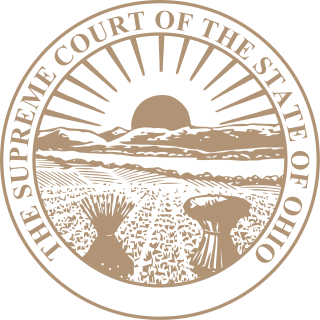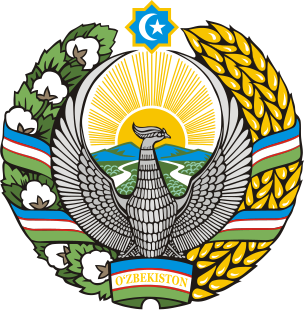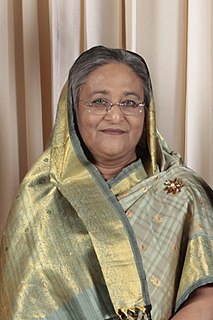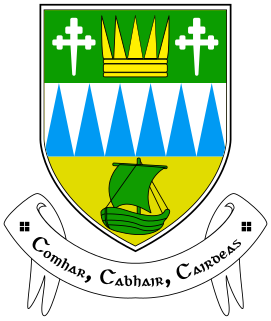
In American politics, the term swing state refers to any state that could reasonably be won by either the Democratic or Republican presidential candidate. These states are usually targeted by both major-party campaigns, especially in competitive elections. Meanwhile, the states that regularly lean to a single party are known as safe states, as it is generally assumed that one candidate has a base of support from which they can draw a sufficient share of the electorate.

The U.S. state of Ohio has a Supreme Court of seven members, who are elected for six-year terms.
See also:
A presidential election is the election of any head of state whose official title is President.
Canada holds elections for legislatures or governments in several jurisdictions: nationally (federally), provincially and territorially, and municipally. Elections are also held for self-governing First Nations and for many other public and private organizations including corporations and trade unions. Municipal elections can also be held for both upper-tier and lower-tier governments. Formal elections have occurred in Canada since at least 1792, when both Upper Canada and Lower Canada had their first elections.
A township, in the context of New Jersey local government, refers to one of five types and one of eleven forms of municipal government. As a political entity, a township in New Jersey is a full-fledged municipality, on par with any town, city, borough, or village. They collect property taxes and provide services such as maintaining roads, garbage collection, water, sewer, schools, police and fire protection. The Township form of local government is used by 27% of New Jersey municipalities; however, slightly over 50% of the state's population resides within them.

Elections in Ukraine are held to choose the President, Verkhovna Rada, and local governments. Referendums may be held on special occasions. Ukraine has a multi-party system, with numerous parties in which often not a single party has a chance of gaining power alone, and parties must work with each other to form coalition governments.

Bulgaria elects on national level a head of state - the president - and a legislature. The president is elected for a five-year term directly by the people. The National Assembly has 240 members, elected for a four-year term by proportional representation in multi-seat constituencies with a 4% threshold. Bulgaria has a multi-party system, in which no one party often has a chance of gaining power alone, and parties must work with each to form governments.

Uzbekistan elects on national level a head of state – the president – and a legislature. The president is elected for a five-year term by the people. The Supreme Assembly has 150 members in the Legislative Chamber, elected for a five-year terms and 100 members in the Senate; 84 members elected at the sessions of district, regional and city deputies, and 16 members appointed by the president. Most parties are excluded.
Uzbekistan is a state dominated by the supporters of a head of state – the president. Opposition parties are allowed, but are widely considered to have no real chance of gaining power.
India is a federation with a parliamentary system governed under the Constitution of India, which defines the power distribution between the union, or central, government and the states.

Isle of Wight is a constituency represented in the House of Commons of the UK Parliament since 2017 by Bob Seely of the Conservative Party.
The Eighth National Parliamentary Elections 2001 were held in Bangladesh on 1 October 2001. 300 single-seat constituencies for the Jatiya Sangsad were contested by 1,935 candidates representing 54 parties and including 484 independents. The election was the second to be held under the caretaker government concept, introduced in 1996. The chief adviser of the caretaker government was Justice Latifur Rahman. The result was a win for the Bangladesh Nationalist Party with its leader Khaleda Zia becoming Prime Minister.
The West Bengal state assembly election of 2006, part of a series of state assembly elections in 2006, was scheduled to occur in five phases. The election took place in the following manner — for 45 assembly constituency (AC)s occurred on April 17, 2006; 66 ACs on April 22, 77 ACs on April 27, 57 ACs on May 3,and 49 ACs on May 8, 2006. The votes were counted three days later on May 11, 2006 and, thanks to the electronic voting machines, all the results were out by the end of the day.

The Seventh National Parliamentary Elections 1996 were held in Bangladesh on 12 June 1996. The result was a victory for the Bangladesh Awami League, which won 146 of the 300 seats, beginning Sheikh Hasina's first-term as Prime Minister. Voter turnout was 75.6%, the highest to date. This election was the second to be held in 1996, following controversial elections held in February a few months earlier.
The United States Senate elections of 1880 and 1881 were elections that coincided with the presidential election of 1880, and had the Democratic Party lose five seats in the United States Senate. The newly elected Readjuster senator caucused with the Republicans, and the Republican Vice President's tie-breaking vote gave the Republicans the slightest majority. All of that changed September 19, 1881 when the Vice President ascended to the Presidency and the Senate became evenly-divided.

The 2011 Plymouth City Council election took place on 5 May 2011 to elect members to Plymouth City Council in England. One third of the council was up for election, in addition to a by-election, making twenty seats in total. The previous election produced a majority for the Conservative Party. The election resulted in Labour gaining 5 seats with Conservatives retaining control.

The Scottish parliament election, 2016 was held on Thursday, 5 May 2016 to elect 129 members to the Scottish Parliament. It was the fifth election held since the devolved parliament was established in 1999. It was the first parliamentary election in Scotland in which 16 and 17 year olds were eligible to vote, under the provisions of the Scottish Elections Act. It was also the first time the three largest parties were led by women.

The 2012 Plymouth City Council election took place on 3 May 2012 to elect members of Plymouth City Council in England. This was on the same day as other local elections. The election was won by the Labour Party, who gained control of the council from the Conservative Party.

Elections to South Cambridgeshire District Council took place on Thursday 22 May 2014, as part of the United Kingdom local elections, 2014. The election was held at the same time as elections to the European Parliament. Nineteen seats, making up one third of South Cambridgeshire District Council, were up for election. Seats up for election in 2014 were last contested at the 2010 election.

The 2019 Indian general election is scheduled to be held in seven phases from 11 April to 19 May 2019 to constitute the 17th Lok Sabha. The counting of votes will be conducted on 23 May, and on the same day the results will be declared.













